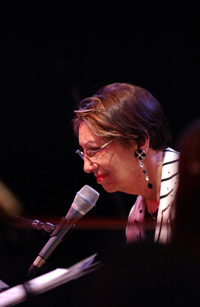"My style of music is mainstream jazz, and I'm also a pianist, so I cover both territories as far as playing and singing. I stress repertoire in my classes, only because too many students don't realize the importance of having a good repertoire when they go out to work. In other words, you need to have an awful lot of songs if you're going to play two sets, three sets a night. You should know the Great American Songbook composers, so many Cole Porter songs, so many Gershwin songs, so many Rodgers and Hammerstein songs, and so forth, and there's a wealth of material out there. It's not the time to start thinking about repertoire when you leave here. Students don't realize that it's not that difficult, but their interest is on anything other than that sometimes. That's okay, but you shouldn't think that you can always learn the songs later. Once you're out there, you can't stand up on stage and read the lyrics."
"I encourage my students to develop a sense of style. They should develop their phrasing, their sense of time, and understand the jazz style—your ballads, your swing, your Latin, certainly, bossa novas, jazz waltz—they should be able to handle those different tempos. It's more than just learning the song and saying, 'Okay, now I know that one. Now I'll do something else.' The phrasing, the interpretation of the lyric is so important. Basically, if you want to do something professionally, the whole package should be there, which means taking responsibility for your music, knowing your songs and the presentation aspects, knowing how to work the microphone—having your own microphone so you know what you sound like all the time and get used to hearing it."
"Whatever I have done professionally and learned professionally, I try to bring into the classroom. Whatever I say, I have done. I don't ask my students to do things I have not done. If I can't do it, maybe they can't do it; but if I can do it, certainly they can do it."

